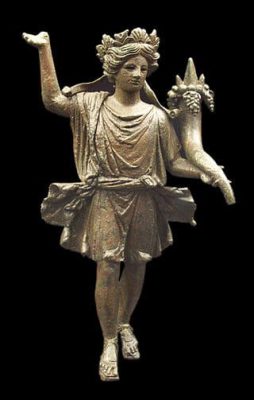Lares were the souls of the dead who were worshipped by the ancient Romans as guardian deities of home and domestic happiness, protecting from misfortunes.
Lara statues were placed on the table during dinners and during other household celebrations, which proves that their presence was believed to be beneficial to the privacy of the home.
In the shrines (lararia) offerings were made in the form of a doll-figurine during ceremonies called Laralia. Then they prayed to the deities and offered sacrifices. On weddings, birthdays or when a boy in the family puts on a boule or toga virilis, a feast was organized, during which the doors of the chapels were opened and offerings of cake, wine, the incense were made, the whole thing was decorated with flowers. The evil souls (larvae) were against the good souls.
There were many types of lares:
- Lares Augusti, the spirits looking after the emperor and his family;
- Lares Compitales (Lares Compitalicii), ghosts looking after local communities and neighborhoods (vici); worshiped during the festival Compitalia. Lar Shrines were usually located at major crossroads (compites) vici;
- Lares Domestici, spirits that look after the household; probably identical to Lares Familiares;
- Lares Familiares, the spirits of family and home care, according to the ancient Romans, they were the souls of deceased ancestors who looked after their relatives. Their images stood next to the hearth in the atrium, or in a separate room called Lararium. At the beginning of the meal, you had to make an offering of food to them, and pray to them when leaving or arriving;
- Lares Grundules
- Lares Hostilii, the spirits protecting the city from its enemies;
- Lares Militares, guardian spirits in the army and during the journey;
- Lares Patrii, possibly the equivalent of dii patrii (deified ancestors) who were worshiped during Parentalia ;
- Lares Permarini, spirits of protection against danger at sea;
- Lares Praestites, spirits who look after Rome, then the state and the community. Their “seat” was in Regia, near the Temple of Vesta. Lary was supposed to protect against fires. Later, the cult of Lar was taken over by Vestal Virgins.
- Lares Publici, protecting the whole city;
- Lares Privati, protecting private homes;
- Lares Rurales, taking care of the fields;
- Lares Urbani, taking care of the state;
- Lares Viales, spirits guarding the roads and their crossroads.

